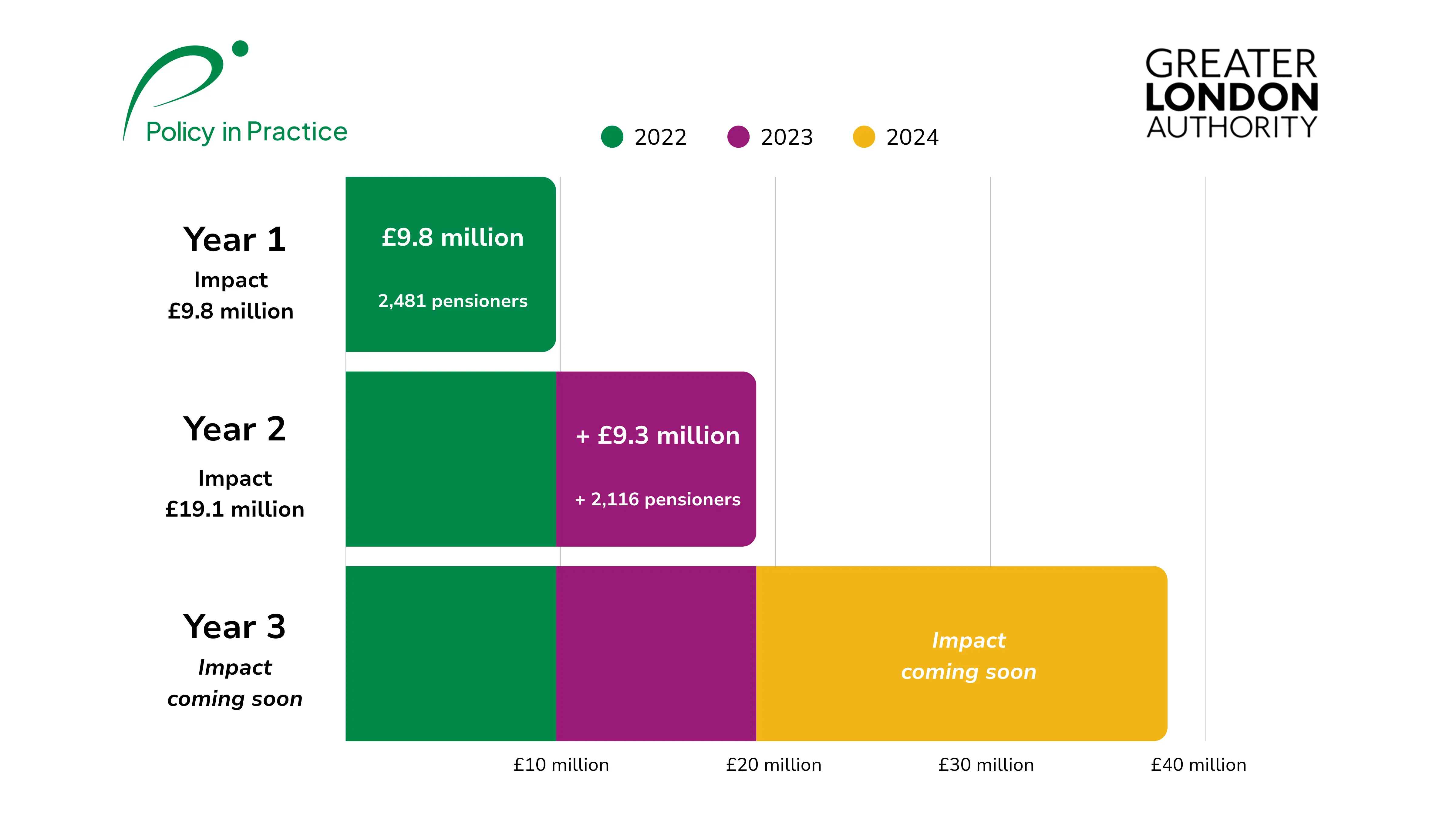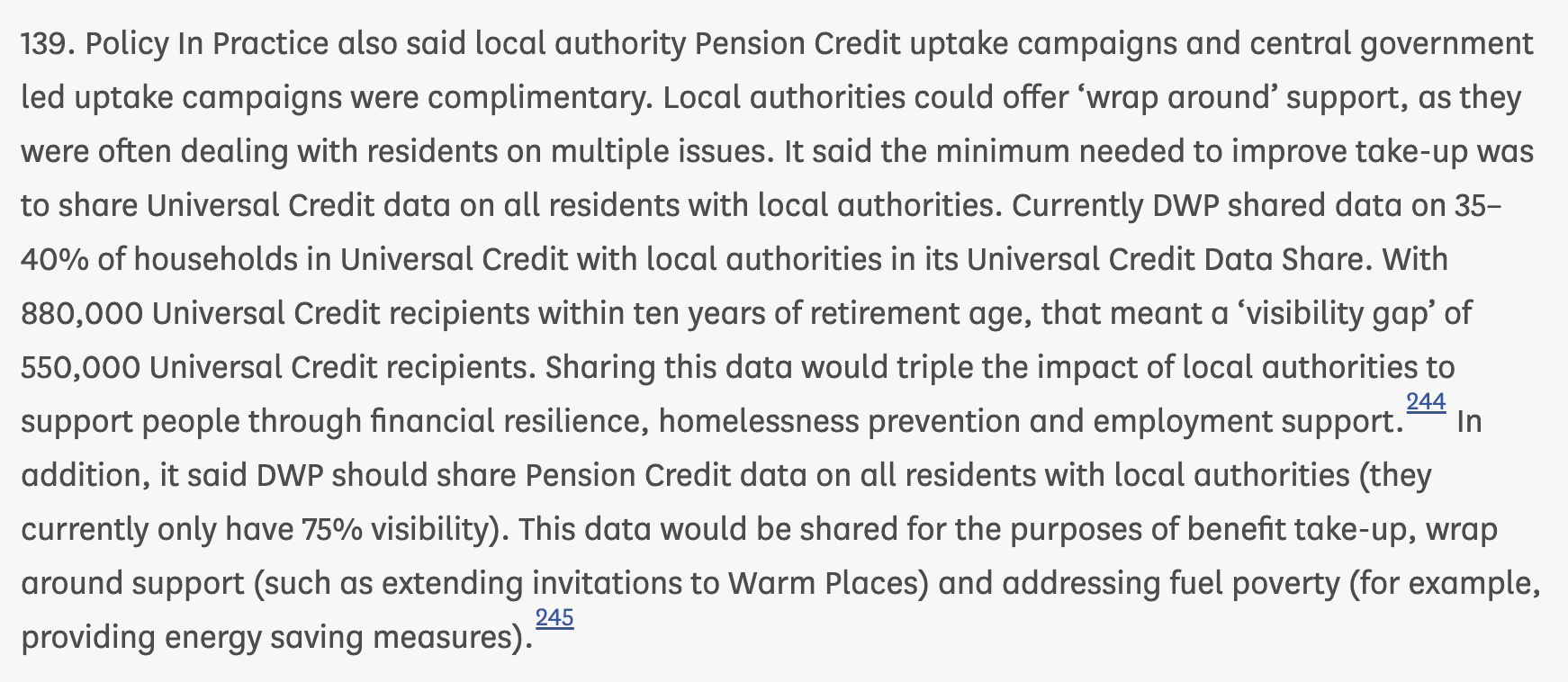Pensioner poverty: Committee backs key changes we called for

One year one from the announcement of the now partially reversed cut to winter fuel payments, the Work and Pensions Select Committee has released a report on Pensioner Poverty.
Policy in Practice was pleased to contribute evidence to the eight month inquiry, shaping several of the report’s recommendations.
Pensioner poverty has been rising, exacerbated by recent cost of living increases. A recent review of pensions by the IFS found that we were not saving enough for retirement. 1.9 million (16%) pensioners today live in relative poverty; 2.8 million are below the Minimum Income Standard. It’s a critical issues as financial hardship forces pensioners to cut back on essentials, negatively impacting their health and accelerating mental and physical decline.
The report, Pensioner Poverty: challenges and mitigations, covers a wide range of issues. This post focuses on their evidence on the barriers to take up of Pensioner Benefits, where Policy in Practice evidence was most commonly cited, along with evidence from Independent Age, local authorities, academics and other experts, all highlighting factors such as limited information sharing, a lack of awareness, embarrassment, trust and complexity.
Winter Fuel Payments were criticised, but boosted awareness and take up of Pension Credit
Linking Winter Fuel Payments to Pension Credit was heavily criticised yet the policy shone a light on pensioner poverty and led to much needed action to boost take up.
The Work and Pensions Committee inquiry on pensioner poverty was prompted by the decision to link Winter Fuel Payment eligibility to Pension Credit from winter 2024/25. The report heavily criticises this policy decision and welcomes its reversal, noting that payments now reaching a majority of pensioners – those with incomes below £35,000.
Through our work with one in three local authorities, we know that financial pressures force pensioners to cut back on essentials like food, energy and social interaction. The report finds that this contributes to poor health outcomes including malnutrition, dehydration, increased falls and respiratory illnesses. These health issues place extra strain on the public sector, as poverty accelerates the ageing process, leading to frailty and increased demand for health and social care services.
Policy in Practice’s work on pensioner poverty is making a difference
The report gives several recommendations and acknowledges the points Policy in Practice raised when giving evidence to the Committee. There is a clear recognition that collaborative local initiatives can improve support for older people without requiring substantial investment.
The Committee’s findings also emphasise that pensioner poverty often stems from working age poverty, particularly among people with part time, multiple or self employed jobs, and those on persistently low incomes.

Cumulative Pension Credit take up campaigns play a critical role in reducing pensioner poverty and delivering lasting economic impact. In London, an ongoing targeted data led campaign commissioned by the Mayor has secured over £28 million for older residents in two years, helping nearly 5,000 households claim an average of £4,173. The impact of the campaign has grown dramatically in Year 3, figures to be released shortly, contact us to register early interest
Other groups at higher risk of poverty include women, who make up two thirds of pensioners living in poverty. This is largely due to labour market inequalities and alignment with other risk factors, such as living alone (22%), being aged 85 or older (21%), renting (34-35%), belonging to a minority ethnic group (25-26%), being disabled (22%), and providing unpaid care (20%).
Call for DWP to improve data sharing to support take up campaigns
In its report the Committe criticises the cliff edge nature of Pension Credit withdrawal, whereby pensioners lose eligibility for Pension Credit, and all of the support that they are passported to, if their income is a penny above the Pension Credit threshold. The value of this passported support can be worth thousands of pounds to a household.
Policy in Practice told the Committee that the planned merger of Housing Benefit and Pension Credit was an opportunity to review the policy alongside the delivery, with the IFS going further, recommending that the pensioner benefit system is integrated with that of working age adults. It called for more details from the government on this important change.
There is strong support in the report for broader benefit take up campaigns, such as for Attendance Allowance and, more longer term, social tariff take up campaigns in energy and water. The Committee wanted wider coverage through the Warm Homes Discount, with automatic payments and direct bill reductions. It also called for greater investment in face to face support, and local welfare provision.
Following it’s eight month inquiry the Work and Pension Committiee’s report on pensioner poverty serves as a critical call to action to policymakers. It underscores the need for a comprehensive, co-ordinated approach to address the growing issue of pensioner poverty in the UK.
Frontline organisations working to maximise people’s income through benefit take up campaigns will find many of the report’s conclusions and recommendations relevant and valuable, including those not covered in this summary.
Next steps
- Join our next webinars:
- Read Pensioner Poverty: challenges and mitigations







